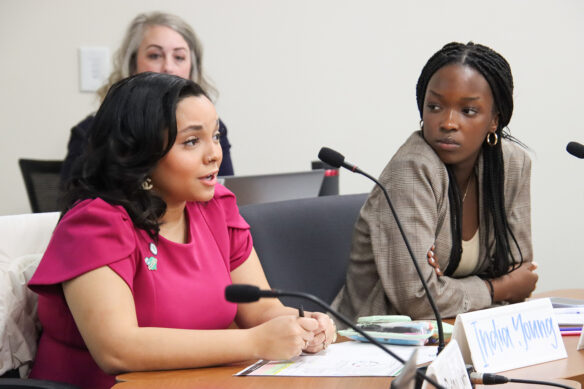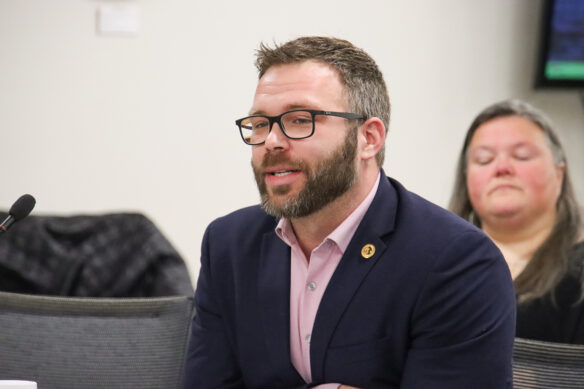
India Young, a junior at Marion County High School, speaks during the Commissioner’s Student Advisory Council meeting.
Photo by Joe Ragusa, Kentucky Department of Education, Jan. 23, 2024
Members of the Kentucky Department of Education’s (KDE’s) Commissioner’s Student Advisory Council discussed their student voice project during the council’s meeting on Jan. 23.
“As part of this student advisory council, I think we’ve all seen the value that we can contribute to making sure that our voice is implemented and we want to share that knowledge,” said Raima Dutt, a senior at DuPont Manual High School (Jefferson County) and chair of the council.
The council typically takes on a project each school year, which have included topics such as school safety and student mental health. This year, members decided to amplify student voice. Dutt said student advisory council leaders have drafted a list of questions to use over the next few meetings to ask education stakeholder groups about student voice.
“We’re planning on making a final report that outlines what the stakeholders are saying,” she said. “(We’re interested in) showing data not only in support of student voice, but also bringing up the concerns many people have.”
Representatives from five advisory councils run by KDE were invited to attend the council meeting for students to seek advice from them anonymously for their project.
When asked to explain their definition of student voice and why it’s important in education, a representative from the School Counselor Advisory Council said, “If I could tell every school something, it would be to give your students a chance to talk. We’re going through this together and you need to know how the students are doing and how are we helping you.”
Student advisory council members asked the counselor about how they felt about implementing meaningful student voice in schools.
“To get to the bottom of what’s going on, you must talk to students,” the counselor said. “They’re the ones who are going through it, so your voice matters.”
Students plan to use the next few advisory council meetings to discuss, review and analyze the interviews with stakeholders from the School Counselor Advisory Council, Superintendents Advisory Council, Teachers Advisory Council and other advisory councils for common themes. They plan to present their findings at the April 24 Commissioner’s Student Advisory Council meeting.
Kentucky Teacher of the Year
2024 Kentucky Teacher of the Year Kevin Dailey spoke with council members to introduce himself and share how he believes the steps he took in his life helped him become the teacher of the year. Dailey started his six-month ambassadorship at KDE at the beginning of January.
“Being the Kentucky Teacher of the Year was a moonshot for me,” said Dailey, who is a middle school social studies teacher at Ballyshannon Middle School (Boone County). “You don’t ever get your moonshot, but I somehow did.”

2024 Kentucky Teacher of the Year Kevin Dailey spoke with the Commissioner’s Student Advisory Council and shared his experience in the classroom.
Photo by Joe Ragusa, Kentucky Department of Education, Jan. 24, 2024
Giving one piece of advice, Dailey told the students to always say yes to opportunities that may come their way, but to make sure those opportunities always align with their values.
“Your values are who you are as a person,” he said. “Don’t let anyone steer you in a way that is not true to yourself and to do that you need to know yourself. Ask yourself those questions and find out who you are.
“I truly believe in public education and the reason I do is because public schools offer places where you get to experience at every single level the most incredible service you could ever imagine, and serving others is something that will leave you fulfilled at the end of the day.”
Dailey asked council members to tell him about a teacher who created magic in the classroom.
“My AP Research class with Mrs. Nina Kearns was my favorite class in all of high school,” said Owen Borden, a senior at Highlands High School in Fort Thomas Independent. “Mrs. Kearns’ constant encouraging attitude inspired every student to explore a subject of their own interest and give their fullest self into their work. Mrs. Kearns was always genuinely interested and invested in our success (and) had an amazing ability to make you feel like your work was making an impact.”
“One teacher that really made a difference for me was Mrs. Cathy Conley,” said Hunter Combs, a senior from Knott County Central High School in Knott County. “I never actually had her in a class and yet she still pushed me to be the best student I could be and to be the student leader I try to be in Knott County.”
Kentucky Education Technology Systems
Associate Commissioner David Couch of KDE’s Office of Education Technology spoke with the council about the Kentucky Education Technology Systems (KETS).
KETS is a pioneer and national leader in most aspects of EdTech. Kentucky is the first state to have high speed internet in every school and classroom, along with the first to have phones in every classroom and the first to deploy cloud-based systems. Kentucky also has the largest student technology leadership program (STLP) in the country.
Couch explained the importance of education technology to the students’ learning experience and all the ways KETS provides support to districts, including internet service, help desk support and cybersecurity. He said this underscores the need for more funding, which has been submitted to the legislature in the form of an additional budget request, especially since Kentucky made vast improvements for schools during the pandemic that were supported by federal COVID-19 relief funds that are expiring.
“We saw during the pandemic that there was a tremendous increase in the amount of bandwidth needed, and it has not subsided,” he said. “Once you turn that on, you can’t turn it back off.”
Couch also discussed artificial intelligence with the council and its growing role in society.
“My words of wisdom for everyone when it comes to artificial intelligence is, try it for yourself; do some different things with it and see the pluses and minuses of it,” he said. “It’s going to get more sophisticated. Like any technology, people overestimate what it does immediately and underestimate what it does in the long term.”
Couch asked the students how they use artificial intelligence in their daily lives.
“It’s good at processing the language that it’s given, but when it doesn’t know exactly what it wants, it does sometimes stray or makes something up,” said Peter Jefferson, a junior at Henry Clay High School (Fayette County).
“It’s going to take a while for people to grasp it, just like it was when the calculator, the computer and the internet came out,” Couch said. “There is a part of processing by people that says, what does this mean and what doesn’t it mean.”
The Commissioner’s Student Advisory Council is scheduled to meet again on Feb. 27.



Leave A Comment